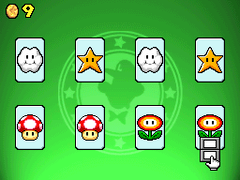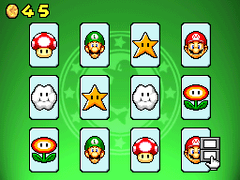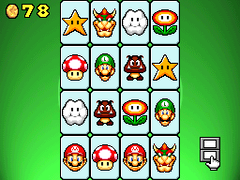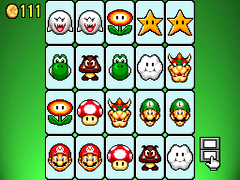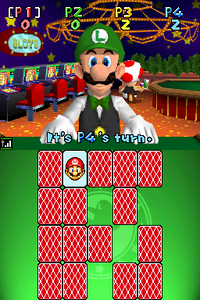Memory Match (Super Mario series): Difference between revisions
No edit summary |
m (→Gameplay) Tag: Mobile edit |
||
| Line 12: | Line 12: | ||
==Gameplay== | ==Gameplay== | ||
===Single player=== | ===Single player=== | ||
After the player bets three [[coin]]s, Luigi serves a group of eight cards upside down, and the player must match them up with their twins. At the start, Luigi's cards feature symbols such as a [[Lakitu's Cloud|Cloud]], a [[Super Mushroom|Mushroom]], a [[Fire Flower]], and a [[Super Star]]. By completing a challenge successfully, the player gains six times the remaining bet coins in ''Super Mario 64 DS'' or nine coins in ''New Super Mario Bros.'' and receives a Star as a point. As the player earns Stars, the minigame gradually increases in difficulty by adding more cards and symbols, including [[Mario]] and Luigi, but also a [[Goomba]], [[Bowser]], a [[Boo]], and [[Yoshi]] in the ''New Super Mario Bros.'' version of the minigame. For every five Stars earned, additional cards are introduced, and in ''New Super Mario Bros.'', some of the cards flip over when Luigi deals them before they flip again. If the player taps two different cards, a coin is given to Luigi from the bet number, causing the player to lose a Star if Luigi takes all these coins. If the player loses all of the money to bet, the [[Game Over|minigame ends]]. | After the player bets three [[coin]]s, Luigi serves a group of eight cards upside down, and the player must match them up with their twins. At the start, Luigi's cards feature symbols such as a [[Lakitu's Cloud|Cloud]], a [[Super Mushroom|Mushroom]], a [[Fire Flower]], and a [[Super Star]]. By completing a challenge successfully, the player gains six times the remaining bet coins in ''Super Mario 64 DS'' or nine coins in ''New Super Mario Bros.'' and receives a Star as a point. As the player earns Stars, the minigame gradually increases in difficulty by adding more cards and symbols, including [[Mario]] and Luigi, but also a [[Goomba]], [[Bowser]], a [[Boo]], and [[Yoshi]] in the ''New Super Mario Bros.'' version of the minigame. For every five Stars earned, additional cards are introduced, and in ''New Super Mario Bros.'', some of the cards flip over for a few seconds when Luigi deals them before they flip again. If the player taps two different cards, a coin is given to Luigi from the bet number, causing the player to lose a Star if Luigi takes all these coins. If the player loses all of the money to bet, the [[Game Over|minigame ends]]. | ||
The ''New Super Mario Bros.'' version of this minigame incorporates the 16 and 20 card variants from Memory Master with some differences. When Luigi serves 16 cards, the player gets eight flipped cards compared to six cards from Memory Master. When he serves 20 cards, the player gets 12 flipped cards compared to eight cards. | The ''New Super Mario Bros.'' version of this minigame incorporates the 16- and 20-card variants from Memory Master with some differences. When Luigi serves 16 cards, the player gets eight flipped cards compared to six cards from Memory Master. When he serves 20 cards, the player gets 12 flipped cards compared to eight cards. | ||
The progression for both games is detailed in the tables below. | The progression for both games is detailed in the tables below. | ||
| Line 98: | Line 98: | ||
===Multiplayer=== | ===Multiplayer=== | ||
[[File:NSMB Memory Match Multiplayer.png|thumb|left|200px|Multiplayer Memory Match game with four players in ''New Super Mario Bros.'']] | [[File:NSMB Memory Match Multiplayer.png|thumb|left|200px|Multiplayer Memory Match game with four players in ''New Super Mario Bros.'']] | ||
In multiplayer mode, which is exclusive to ''New Super Mario Bros.'', the minigame features 20 cards arranged in a 5×4 grid similarly to its single-player version after the player reaches 15 Stars. The first player is chosen randomly, and subsequent turns follow this established order. If the cards a player taps match, the player earns two [[point]]s and | In multiplayer mode, which is exclusive to ''New Super Mario Bros.'', the minigame features 20 cards arranged in a 5×4 grid similarly to its single-player version after the player reaches 15 Stars. The first player is chosen randomly, and subsequent turns follow this established order. If the cards a player taps match, the player earns two [[point]]s and can continue until they are wrong. Once all the cards are gone, the player with the most points wins. Unlike its single-player counterpart, this version of the minigame does not offer hints at the start of each game. | ||
==In-game instructions== | ==In-game instructions== | ||
Revision as of 09:48, September 16, 2024
| Memory Match | |||
|---|---|---|---|
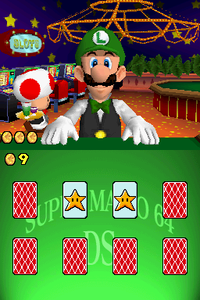 The minigame in Super Mario 64 DS | |||
| Appears in | Super Mario 64 DS New Super Mario Bros. | ||
| Type | Luigi's minigame (Super Mario 64 DS) Table minigame (New Super Mario Bros.) | ||
| |||
Memory Match is one of Luigi's minigames in Super Mario 64 DS and a Table minigame in New Super Mario Bros. This minigame plays identically to the real-world card game Concentration.
A harder version of this minigame called Memory Master is exclusive to Super Mario 64 DS.
Gameplay
Single player
After the player bets three coins, Luigi serves a group of eight cards upside down, and the player must match them up with their twins. At the start, Luigi's cards feature symbols such as a Cloud, a Mushroom, a Fire Flower, and a Super Star. By completing a challenge successfully, the player gains six times the remaining bet coins in Super Mario 64 DS or nine coins in New Super Mario Bros. and receives a Star as a point. As the player earns Stars, the minigame gradually increases in difficulty by adding more cards and symbols, including Mario and Luigi, but also a Goomba, Bowser, a Boo, and Yoshi in the New Super Mario Bros. version of the minigame. For every five Stars earned, additional cards are introduced, and in New Super Mario Bros., some of the cards flip over for a few seconds when Luigi deals them before they flip again. If the player taps two different cards, a coin is given to Luigi from the bet number, causing the player to lose a Star if Luigi takes all these coins. If the player loses all of the money to bet, the minigame ends.
The New Super Mario Bros. version of this minigame incorporates the 16- and 20-card variants from Memory Master with some differences. When Luigi serves 16 cards, the player gets eight flipped cards compared to six cards from Memory Master. When he serves 20 cards, the player gets 12 flipped cards compared to eight cards.
The progression for both games is detailed in the tables below.
Super Mario 64 DS
| Stars | Image | Symbols | Cards served |
|---|---|---|---|
| 0–4 | 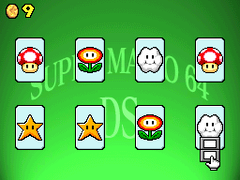 |
|
8 |
| 5–9 | 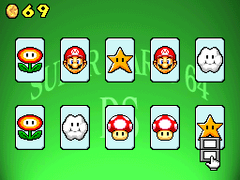 |
|
10 |
| 10 and above | 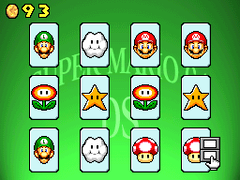 |
|
12 |
New Super Mario Bros.
Multiplayer
In multiplayer mode, which is exclusive to New Super Mario Bros., the minigame features 20 cards arranged in a 5×4 grid similarly to its single-player version after the player reaches 15 Stars. The first player is chosen randomly, and subsequent turns follow this established order. If the cards a player taps match, the player earns two points and can continue until they are wrong. Once all the cards are gone, the player with the most points wins. Unlike its single-player counterpart, this version of the minigame does not offer hints at the start of each game.
In-game instructions
- Super Mario 64 DS: "Pick two matching cards to make them disappear. Clear all the cards to win."
- New Super Mario Bros.
- Single player: "Pick two matching cards to make them disappear. Clear all the cards to win. If you make three mistakes, Luigi wins."
- Multiplayer: "Take turns choosing cards. If you find two matching cards, you get to keep them. Which of you has the best memory?"
Names in other languages
| Language | Name | Meaning | Notes |
|---|---|---|---|
| Japanese | ルイージのしんけいすいじゃく[?] Ruīji no Shinkei Suijaku |
Luigi's Concentration Game | |
| Chinese | 记忆测试[1][2] Jìyì Cèshì |
Memory Test | |
| French | Mémorisation[?] | Memorisation | |
| German | Gedächtnistraining[?] | Memory Training | |
| Italian | Accoppiata vincente[?] | Paired winning | |
| Korean | 루이지의 같은 그림 찾기[?] Ruiji ui gateun grim chatgi |
Luigi's Concentration Game | |
| Spanish | Test de Luigi[?] | Luigi's Test |
